"Oprichnoe case" of Ivan the Terrible
One of the main mysteries of the Russian stories is the establishment by Ivan IV of his personal, separate from the state appanage - the infamous oprichnina.
The strange "flight" of Ivan IV
On December 3, 1564, something unheard of happened in Russia. Ivan IV, the legitimate monarch, whose power no one seemed to dispute, left Moscow without announcing a reason in an unknown direction.
The tsar, of course, was not obliged to obtain permission to leave the capital, but he had to inform the Duma about his plans and leave some orders for the period of his absence. At the same time, he tried to do everything possible so that the entire population of Moscow would know about his departure. The tsar took the army, the state treasury, church relics, children, as well as many boyars with their families. It was a demonstration of either flight, or some kind of emergency evacuation. There were simply no visible and understandable reasons for such actions. Rumors in Moscow went bad and very disturbing, including about the imminent, hitherto unprecedented, campaign of the Tatars against Holy Russia. Two letters of Ivan IV, which came to Moscow from Aleksandrovskaya Sloboda in the first days of January 1565, did not clarify anything, but only completely confused the situation. In the first of them, the fugitive tsar Ivan accused the boyars of numerous insults that they inflicted on him “due to his infancy” (the tsar at that time was over 34 years old), and the clergy of harboring some “traitors”. And in the second, addressed to the merchant and townspeople of Moscow, it was said that there was no royal anger against the common people, and Ivan did not reproach them for anything.
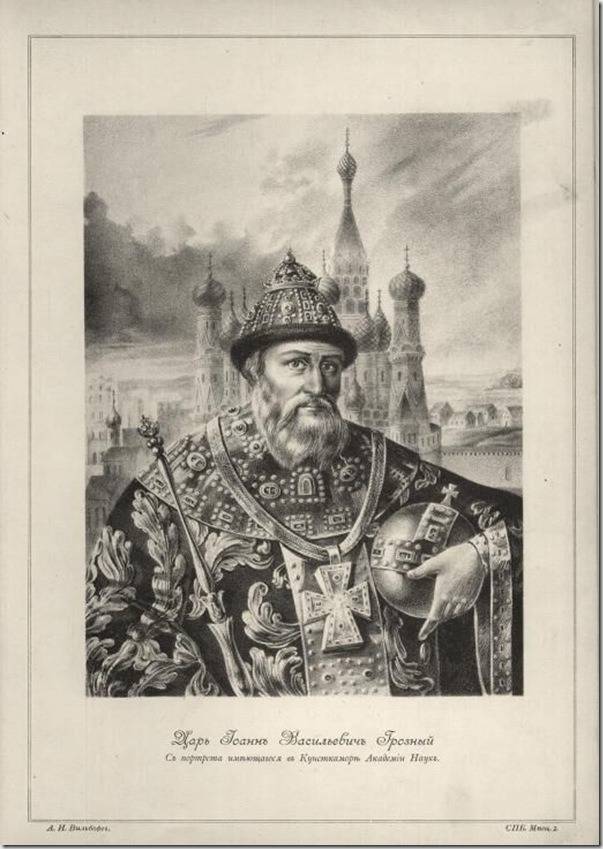
Ivan IV in a portrait kept in the Kunstkamera
Recall that in childhood and youth, Ivan IV was indeed subjected to humiliation by the boyars Shuisky and Belsky. He later recalled:
He:
However, back in December 1543 (21 years ago), Ivan IV ordered the kennels to seize Andrei Shuisky, who believed in his omnipotence, and throw him into prison. The servants then "overdid it" - they strangled the boyar. But for Ivan, in the end, it turned out even “better”: the rest of the boyars realized that the “jokes” with the tsar were over, and immediately moderated their arrogance.
In 1564, under Ivan IV, of course, no one “thrown his feet in boots” on the bed, and he did not endure the need for clothes and food. Kazan (1552) and Astrakhan (1554) had already been taken. Moreover, the tsar also got rid of the members of the Elected Rada that bored him: in 1560 Adashev and Sylvester were sent into exile, Andrei Kurbsky fled to Poland in 1564.
At the disposal of historians there is no information about the presence of serious boyar opposition to the power of Ivan IV at the time of his departure from Moscow. And no popular riots, with which the history of Russia is so rich, were also not recorded at that time by any of the sources. The foreign policy situation was also quite favorable. Most recently (in the autumn of 1564), Alexei Basmanov and his son Fyodor repelled the attack of the Crimean Tatars Devlet Giray on Ryazan, and then pursued them, capturing 500 prisoners, among whom was Murza Mamai.
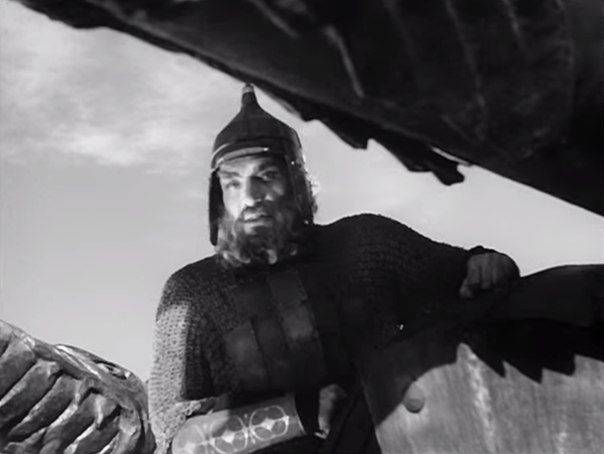
This is how Alexei Basmanov was seen by the audience of the famous film "Ivan the Terrible" (S. Eisenstein, 1944)
Events on the fronts of the Livonian War at that time did not cause much concern - the main failures were ahead.
Some historians have tried to connect the tsar's flight from Moscow with the death of his first wife, Anastasia, in whose poisoning he allegedly suspected the boyars. Like, Ivan was afraid that he would be poisoned - after his wife. However, Anastasia died six months before those events (July 27, 1560), and not suddenly, but after a serious illness that lasted 10 months. Yes, and the grief of Ivan IV after the death of his wife was very short. Eight days later he told the courtiers:
One gets the impression that the sick wife had long been a burden to him, and the king was waiting for her death, which would untie his hands and allow him to enter into a new marriage.
In general, no one in Moscow understood anything, but on behalf of the metropolitan, the boyars and townspeople, an embassy was sent to Ivan the Aleksandrovskaya Sloboda with a request to return and continue the reign. Ivan agreed, but not for nothing, but with conditions. The first of these was the right of free reprisal against "traitors" and persons objectionable to him. And the second - the separation of the royal "household" from the rest of the state. The tsar took for himself such cities as Mozhaisk, Vyazma, Kozelsk, Belev, Przemysl, Medyn, Galich, Suzdal, Vologda, Kostroma, Ples, Kashin. In Moscow, for his people, he received Arbat, Sivtsev Vrazhek, Nikitskaya Street. And the main residence of the tsar has now become Aleksandrovskaya Sloboda (the modern city of Aleksandrov, Vladimir Region).
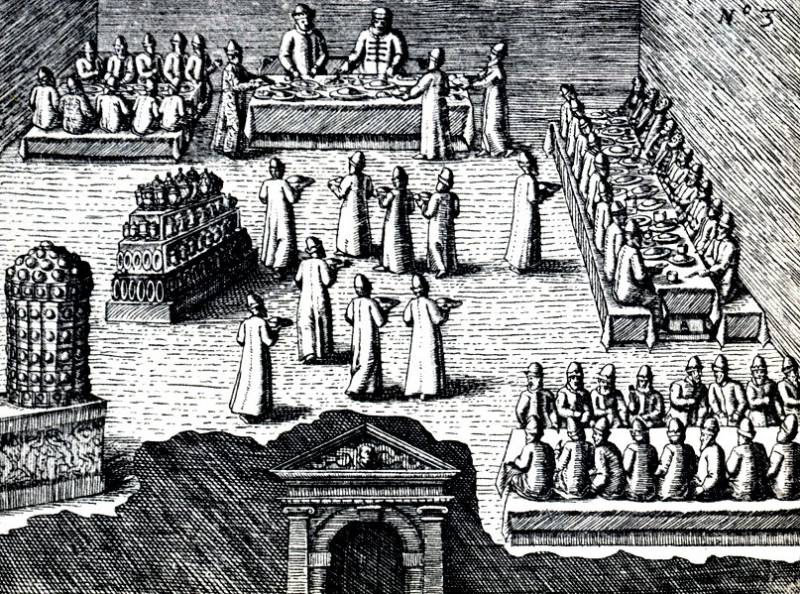
Johann Theodor de Bry. Alexander Sloboda. Feast at the court of Ivan IV. Early XNUMXth century engraving
This is how the famous oprichnina appeared, about which Klyuchevsky wrote that she:
It should be said that the word "oprichnina" has two meanings. The first is the "widow's share", which was given to the wives of deceased nobles. The second is the best dishes that the host at the feasts kept to himself in order to share them with selected guests. Which of them did Ivan IV have in mind? This, apparently, only the king himself knew.
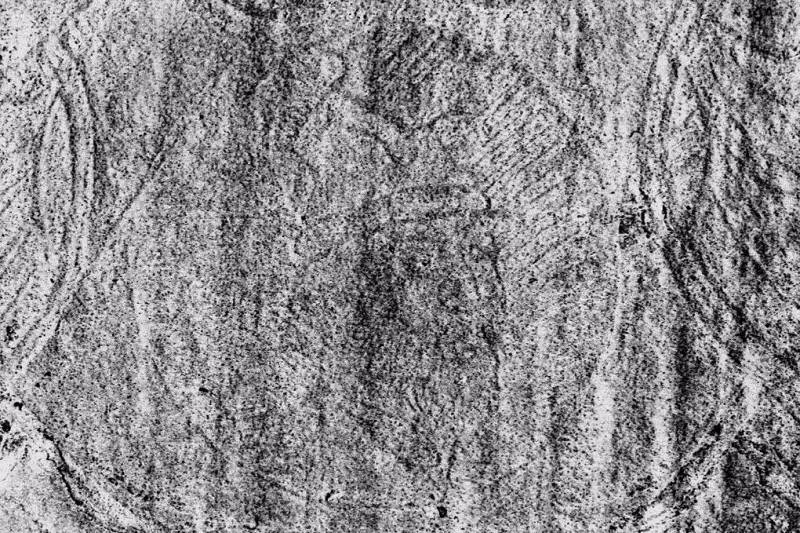
Poorly visible, the only true lifetime portrait of Ivan the Terrible on the cover of the first printed "Apostle" of 1564
Fear of Ivan the Terrible
But what was the meaning of this performance with the departure of the tsar from Moscow? Many historians see in it a not too skillful performance, thanks to which Ivan IV, with the permission of the people, began many years of repression against his real and imaginary enemies. However, it is known that in the month and a half that the tsar then spent in Alexander Sloboda, he changed dramatically. Some sources claim that Ivan has noticeably aged and even gone bald. It is very likely that his experiences and fear were sincere and unfeigned. And this is very strange, because, in general, he had nothing to be afraid of. Next to Ivan and under his supervision were his sons and the main contender for the throne - cousin Vladimir Staritsky, bound by two "cross-kissing" letters of allegiance. And with the tsar there was an army loyal to him, which he led away from Moscow. Under such circumstances, would anyone try to announce claims to the royal throne?
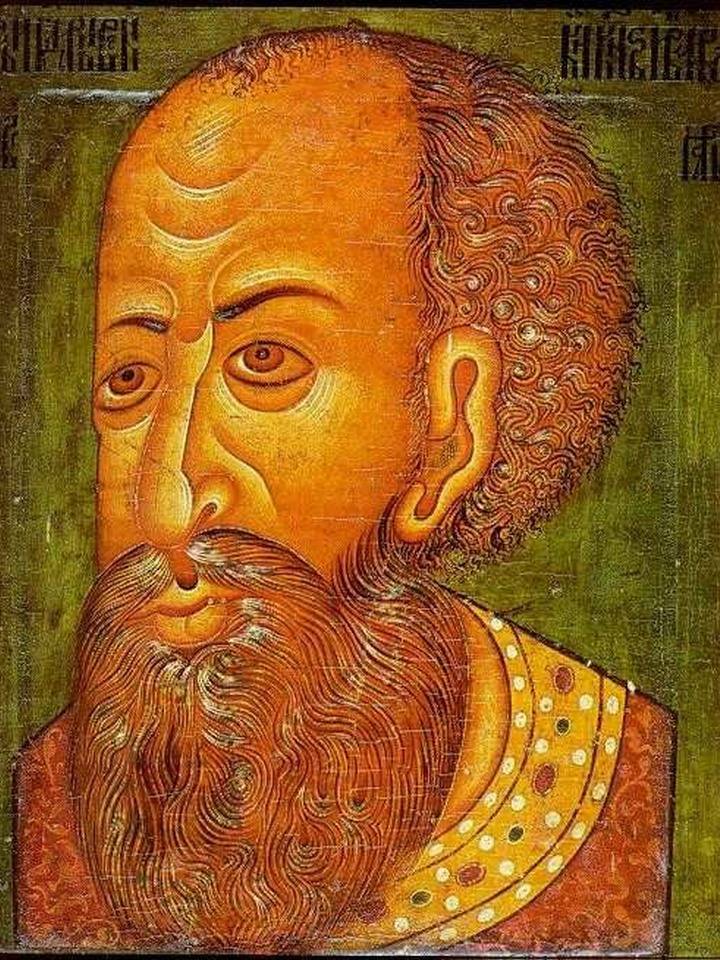
Ivan IV. Parsuna. XNUMXth century
But in the future, some genuine and inexplicable fear haunted Ivan IV. He quite seriously asked the English Queen Elizabeth for asylum for himself and his family in case of flight from the country and began the construction of ships that could reach London. The state treasury was transferred to Vologda. In the Cyril Monastery, he ordered to prepare cells for himself and his sons. Paranoia? But at the same time, the tsar's struggle with the "traitors" is distinguished by a strange inconsistency, which makes it difficult to explain his actions both by mental illness and by considerations of state expediency. Agreeing that the struggle for the centralization of power was necessary, V. Klyuchevsky was perplexed:
Here is the most striking example of the inconsistency of Ivan IV. In 1569, he forced his cousin Vladimir Staritsky, his wife and eldest daughter to drink poison, exterminated all those close to the prince. That is, it seems to have destroyed the very possibility of a rebellion or attempts at separatism by this influential and noble family. But why did he then transfer his inheritance and title to the son of the executed Vladimir? Where can one see the struggle of Ivan IV for the centralization of power?
Other influential boyar families, whose members were descended from specific princes, also retained their land holdings. The place of the destroyed authoritative and senior representatives of the families was taken by the junior and secondary ones, who continued to remain sovereign and semi-independent rulers of their estates.
Oddities of the "Pogrom of Novgorod"
Everyone knows about the defeat of Novgorod by Ivan the Terrible during the campaign of 1569-1570. (on the way, he ruined Yaroslavl at the same time). However, in 1569 Tver, Medyn, Torzhok, Vyshny Volochek were also devastated. Recall, by the way, that Medyn was an oprichny, that is, a city that belonged personally to the king - and this did not save it from being defeated by the oprichny army.
If the campaign of Ivan IV against Novgorod can still be explained by the need to combat the separatist sentiments of its inhabitants, then punitive operations against other cities are puzzling. At the same time, all the pogroms of completely peaceful and not rebellious cities were in the nature of a military operation. Ahead and along the flanks of the army of guardsmen, detachments allegedly marched, detaining or even destroying all the people who had the misfortune to meet them on the way. The doomed cities were surrounded and blockaded so that no one would be able to get out of them. Involuntarily, one gets the impression that Ivan the Terrible was looking for something (or someone) in them and tried very hard so that the enemy unknown to us would not escape him.
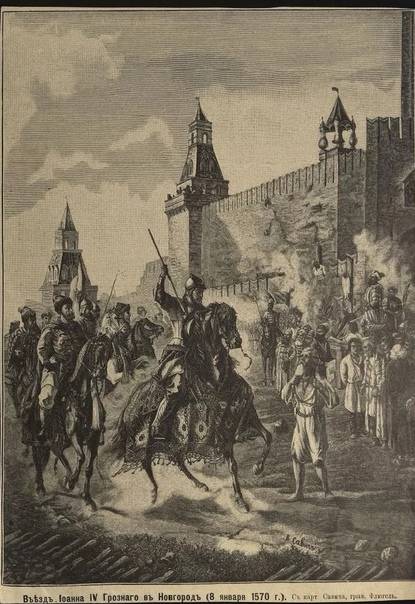
Savichev A. Entry of Ivan IV the Terrible to Novgorod on January 8, 1570
As you know, Novgorod suffered especially hard. They say that in January-February 1570, not only trading warehouses and shops, but also churches and monasteries were looted in the city, all the clergy were destroyed, and even that in the district for 200-250 miles all bread was burned and cattle were slaughtered. In general, the day was considered “light and fertile”, when only 500-600 people were thrown into the Volkhov bound.
Meanwhile, the “German” Staden, who seems to be supposed to “slander” the Russian Tsar, writes that it was not people who were drowned in Volkhov, but the unnecessary property of the executed:
But even more interesting is another testimony of this author:
That is, mostly foreigners and their Novgorod supporters were repressed.
Schlichting and Guagnini also turned out to be very "modest" and moderate authors. Talking about those events, they write about 2770 killed citizens, however, adding:
Schlichting, in addition, reports that out of 300 boyars arrested and brought to trial, 184 were found not guilty.
Taube and Kruse bring the number of victims to 15 thousand people (by the way, A. Kurbsky agrees with them). But even this is much less than the figures given in the Novgorod and Pskov chronicles - 30 thousand and 60 thousand, respectively. However, Jerome Horsey surpassed everyone, before whom Ivan IV allegedly boasted of his treasures:
The Englishman, without hesitation, writes about 700 thousand (!) victims, which completely compromises his testimony.
It is currently believed that in the middle of the 30th century the population of Novgorod did not exceed 1581 thousand people. Papal Nuncio Antonio Possevino, who visited Novgorod in October 1582 and January 20, estimates its population at 000. A. A. Zimin and A. L. Khoroshkevich in the book “Russia in the Time of Ivan the Terrible” cite an “average” figure of 26 people.
The memorial lists of the Novgorod synodicists for that year contain the names of 2800 people (a figure very close to the data of Schlichting and Gvagnini), but not all of them were killed: some died of natural causes.
The remains of about 10 thousand people were found in a mass grave near the Nativity Church, but in 1570 the plague came to Novgorod, and, quite possibly, it was she, and not the repressions of Ivan IV, that dealt the main blow to this city.
The number of those executed could hardly exceed two and a half thousand. And the famous Malyuta Skuratov, in his report (“fairy tale”), even claims that 1490 people were executed in Novgorod and 15 were killed from squeakers (perhaps when trying to resist). It is unlikely that he wanted to downplay the "exploits" of the guardsmen loyal to the tsar.
It is curious that after those events, Ivan IV took the Trade side of Novgorod to the oprichnina and built his palace here. But at the beginning of 1572, without formally abolishing this division of the city into oprichnina and zemstvo parts, the tsar actually restored the traditional system of government. He appoints the boyar Mstislavsky as his deputy, to whom the oprichny boyar P. Pronsky was now forced to obey. In the same 1572, allegedly completely devastated Novgorod became the royal headquarters and rear base of the Russian army leading the Livonian war. The state treasury is delivered to it and placed in the church cellars of the zemstvo (not oprichnina) part of the city.
Some historians believe that the story of the Novgorod pogrom of Ivan IV is more consistent with the actions in the same city of his grandfather, Ivan III, whom his contemporaries also called Grozny. He then (in the winter of 1487) expelled from Novgorod all the boyars, all the richest merchants and half of the merchants of the “middle hand”, as well as about 7 thousand citizens. Perhaps, in the memoirs of descendants and the writings of later authors, these two events merged into one.
Many people think that after the pogrom perpetrated by Ivan IV, Novgorod became an ordinary Russian city, but this is not true: it retained the right to mint coins and independence in diplomatic relations with Livonia and Sweden. And for what then was this campaign made? And, most importantly, what was the result? If Ivan IV really fought against Novgorodian separatism, then it was exactly the opposite. During the Time of Troubles, the Novgorodians unanimously decided to secede from Moscow and accepted the Swedish corps of General Delagardie.
Academician S. B. Veselovsky could not find any system in the repressions of Ivan the Terrible. The tsar's wrath was not directed at any particular social group - the boyars, the merchants or the clergy. Separate families were selectively subjected to repressions, which were completely cut out. In the devastated cities and counties, all their inhabitants suffered to the same extent - regardless of their origin, position in society and wealth.
"The best cities and the worst people" for Ivan IV
Another contradiction in the domestic policy of Ivan the Terrible was noted by V. Klyuchevsky, who wrote:
For himself, the tsar chose “the best cities and the worst people”, whom the foreigners who served in the oprichnina called murderers and scumbags politically incorrect.
Albert Schlichting wrote:
It is curious that the guardsman Vasily Gryaznov, who was captured by the Tatars, in a letter to Ivan the Terrible (with a request for a ransom) assured the tsar that he personally "bitten to death" 6 people.
Heinrich Staden argued that, according to the oath, the guardsmen not only did not have the right to maintain contact with anyone from the "Zemshchina", but even had to give up their father and mother, if they were "Zemstvo".
But the guardsmen did not feel safe at all.
Taube and Kruse wrote about the same. According to the recollections of foreigners, the guardsman, caught in any relationship with the Zemstvo, was killed without trial, the whole family of his acquaintance was cut out.
And Schlichting, already quoted by us, states:
Another oddity was the almost obligatory presence of Ivan the Terrible at "interrogations with passion." The pleasure is rather dubious: either this king was a complete sadist, or his desire to hear answers to some questions was very great.
The fate of the guardsmen
And then Ivan the Terrible suddenly "cured" of his fear - somewhere around 1571. The former closest associates of the tsar were accused of treason, and not only ordinary performers, but also the top leaders of the oprichnina - Basmanov, Vyazemsky, Gryaznov and some others - were executed on Moscow squares. Malyuta Skuratov took the most active part in their destruction; And then a royal decree came out banning the mention of the word "oprichnina" itself. Officially, contrary to popular belief, it was not abolished during the life of this tsar, it was just that the oprichniki became “yard people”, the oprichny cities and lands became “yard yards”. The tsar writes a will, in which the decision on the fate of the oprichnina is transferred to the discretion of his sons, Ivan and Fedor: “how it is more profitable for them, and they repair". It seems that Ivan IV himself does not need and is not interested in both the oprichnina and the guardsmen now.
Sometimes they write that the reason for the change in the attitude of Ivan IV towards the guardsmen was their inability to protect Moscow from the Tatars in 1572. However, this is not entirely true: in the famous battle of Molodi (between July 29 and August 2, 1572), guardsmen, commanded by Dmitry Khvorostinin, also participated - and they fought very well. Their advanced regiment defeated the Tatar rearguard and then led the main army to the hill, on which the walk-city was already deployed. But then the hitherto unthinkable happened: the guardsmen became part of the zemstvo army and obeyed the zemstvo governor Mikhail Vorotynsky. That is, the battle of Molodi was won by the united Russian army. And here the cause is confused with the effect. Ivan IV did not become angry with the guardsmen after that battle, but put them in a subordinate position because he had already decided on their future fate before it began.
The tone of Ivan the Terrible when dealing with the British also changed dramatically. He now refers to Queen Elizabeth in correspondence not "our noble sister", but "a vulgar girl who is ... ruled by trading men". The English ambassador is informed about the withdrawal of the request for "political asylum" for Ivan IV and his family. The goods of English merchants were seized. All work to strengthen Vologda has stopped, the construction of other oprichnina fortresses has stopped.
“Fuel to the fire” is added by a well-known fact: many documents of the era of Ivan the Terrible were seized from the archives by order of Metropolitan Filaret (father of Mikhail Romanov) and Tsar Alexei Mikhailovich (grandson of Filaret), which documentary evidence of clerks of that time has been preserved. And at the beginning of the 1626th century, the materials of the detective case about the “Novgorod Treason” also disappeared from the archives. In the Census Book of the Ambassadorial Order in XNUMX, the following description of these documents is given:
The “cleansing of the archives” is usually explained by the fact that the Romanovs justified their rights to the throne solely by property with Ivan IV through his first wife, Anastasia Zakharyina-Romanova. And, apparently, there were some facts inconvenient for the new dynasty, which they decided to consign to oblivion. Perhaps some of the documents destroyed then could answer the question about the reasons for the appearance of the oprichnina.
We will try to talk about the possible reasons for the fear of Ivan the Terrible in the next article.
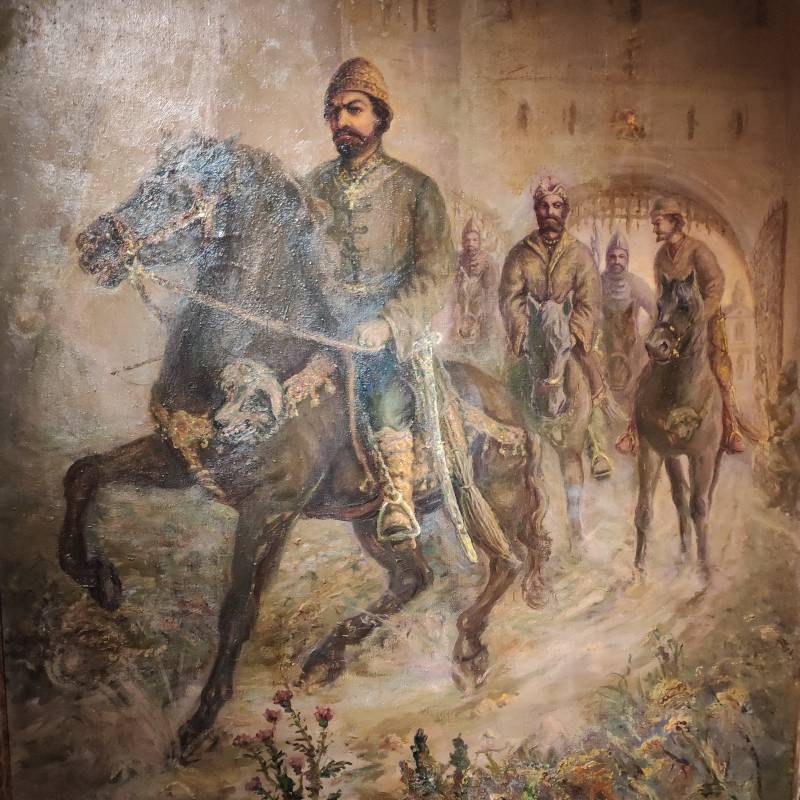
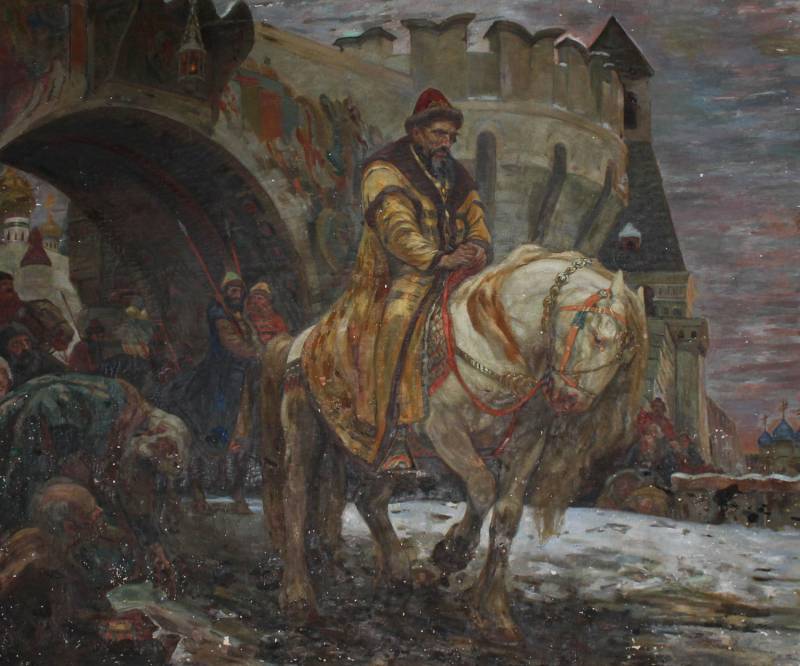
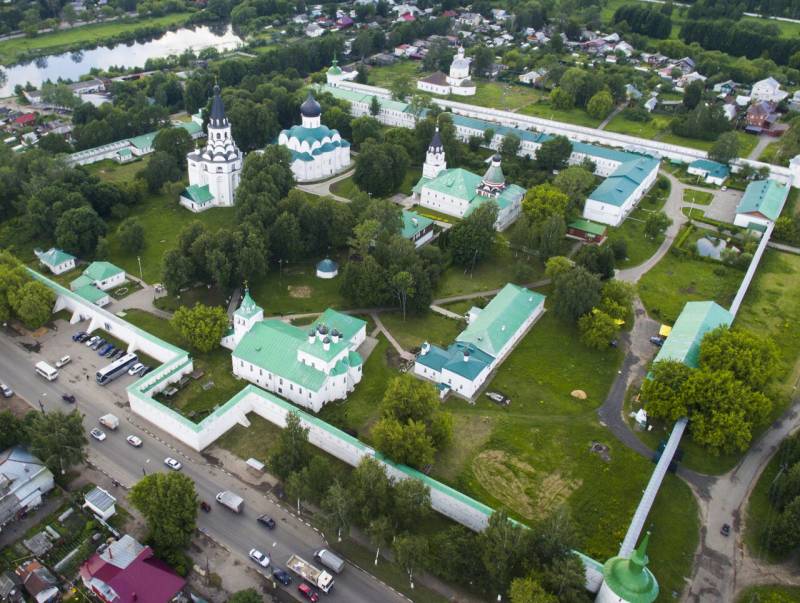
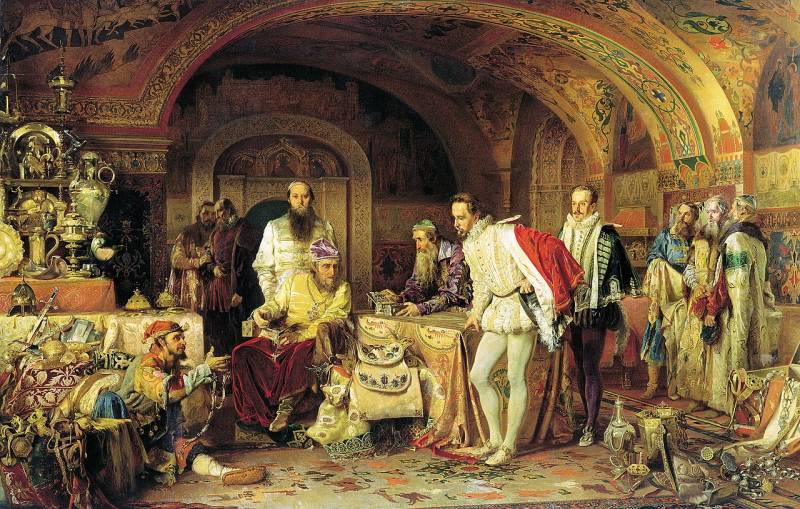
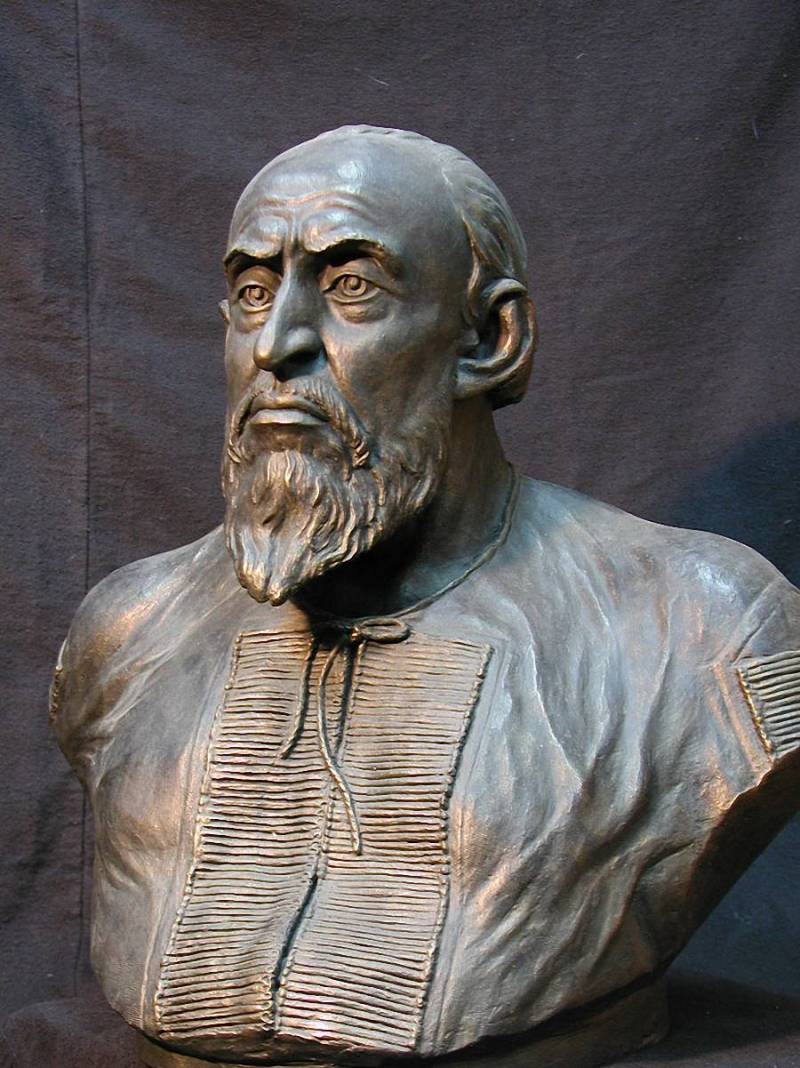
Information